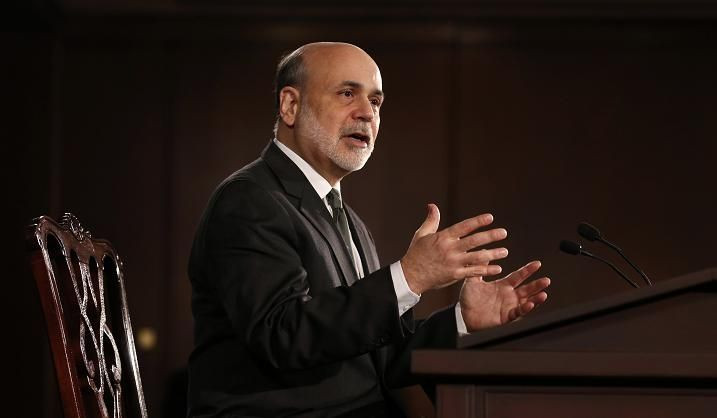Fiscal Cliff 2012: What It Means For The Federal Reserve

After Federal Reserve Chairman Ben Bernanke coined the term “fiscal cliff," nearly every reference made to the “massive” negative effects such an event would have on the U.S. economy has been followed by an admonition that politicians need to act, since, when push comes to shove, the central bank won't be able to do much.
“We want to be clear,” the top central banker said on Dec. 12. “We cannot offset the fiscal cliff.”
Now, as gridlock in Washington makes it increasingly more likely the Fed will be put in the tight spot of having to do something to offset the economic hit the national economy faces, the Fed looks poised to be tested.
It’s a position Bernanke and his peers never wanted to be in. The main concern is to the credibility of the central bank and the damage it could do to the American political system. The “fiscal cliff,” being a politically-induced crisis, should be solved by politicians coming together to take reasonable action, goes the Fed thinking. If the central bank steps in to figuratively bail out the politicians from the consequences of their recklessness, no politician in the future will have an incentive not to act recklessly in economic matters.
At the same time, after spending more than four years performing CPR on the foundering U.S. economy, it’s unlikely the central bank will just allow a recession to happen without executing some aggressive maneuvering.
"If there was a sharp slowdown in the U.S., I do think we'd have further scope to take action, we'd be taking on more risk, but we could do it if the situation called for it," James Bullard, president of the Federal Reserve Bank of St. Louis, said last May.
It would be a tricky proposition for the Fed, as it could look to promise further stimulus to the economy while also looking to retain enough “dry powder” to use if yet another shock -- say, a deterioration of the crisis in Europe -- were to take place. Pessimists point to this fact, combined with the moral hazard of looking like the Fed will always be there to clean up after Washington’s mess, as being enough to stay the Fed’s hand.
Among those arguing the Fed will not do much next year are those who note it’s been the central bank leadership itself that has been advocating for a Congressional resolution to the issue in the earliest and loudest fashion, from the moment Bernanke told the House of Representatives nearly 10 months ago how his one hope was that “Congress will look at that and figure out ways to achieve the same long-run fiscal improvement without having it all happen at one date."
Indeed, during his most recent press conference, Bernanke was challenged over whether the term “fiscal cliff” was alarmist, to which he responded that while “you don’t want to scare people,” going off the fiscal cliff would “have a very negative effect on hiring, jobs, wages, economic activity and investment.”
“It’s exceptionally important and urgent that Congress come to a sensible agreement,” Bernanke added.
There’s an ever-more-nuanced view within that camp that, even if it’s possible, the Fed will be able to pull something from its sleeves to counteract any future crisis, it isn't clear it should do so.
“The Japanese experience told us that when the private sector is minimizing debt or deleveraging with very low interest rates, there's very little monetary policy can do,” Richard Koo, an economist for Nomura told Bloomberg News.
“In fact, Chairman Bernanke has been saying since the middle of last year that this is no time to cut budget deficits. The fiscal stimulus should be in place because I think he also understands that under the circumstances, there's so little that monetary policy can do,” Koo explained, adding that “control of the U.S. economy is really in the hands of Congress.”
On the other side of the argument, pundits like to point out that, as noted by the Washington Post's Neil Irwin, that “for five years running, the Fed under ... Bernanke has had a remarkable track record of moving creatively, aggressively and quickly to try to ease policy and get the U.S. economy on track -- usually more creatively, more aggressively, and more quickly than those who spend their days watching the Fed thought possible.”
Experts point out that the most likely thing the Fed would do is to rejigger expectations by pursing a policy called “nominal GDP targeting.” It’s a policy that has been advocated by dovish San Francisco Fed President John Williams.
It would certainly follow the Fed’s recent move along the policy arc. After being chastised during an August conference by a paper from Columbia University's Michael Woodford that, essentially, the Fed was not making it clear to the markets what its long-run intent on U.S. economic growth was, the central bank announced in September it would provide accommodative monetary policy until the U.S. economic recovered, pegging “mid-2013” as a likely date. It went more specific this month, suggesting it would continue policy until unemployment dipped below 6.5 percent (years away from its current level of 7.8 percent).
Setting a long-run GDP growth target would be just another step on that ladder, and one that economists are increasingly arguing would not have as many unintended consequences as feared.
“The time is right for the world’s central banks to reconsider the framework they use in conducting monetary policy,” Jeffrey Frankel, a Harvard economics professor, wrote on economics site VoxEU on Wednesday, “Monetary policymakers would do well to consider a shift toward targeting nominal GDP.”
Whatever ends up happening, 2013 will surely be an interesting year for Bernanke.
© Copyright IBTimes 2024. All rights reserved.





















